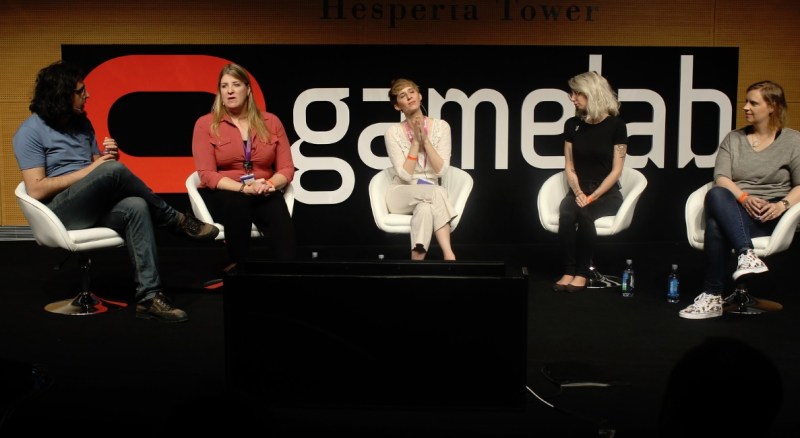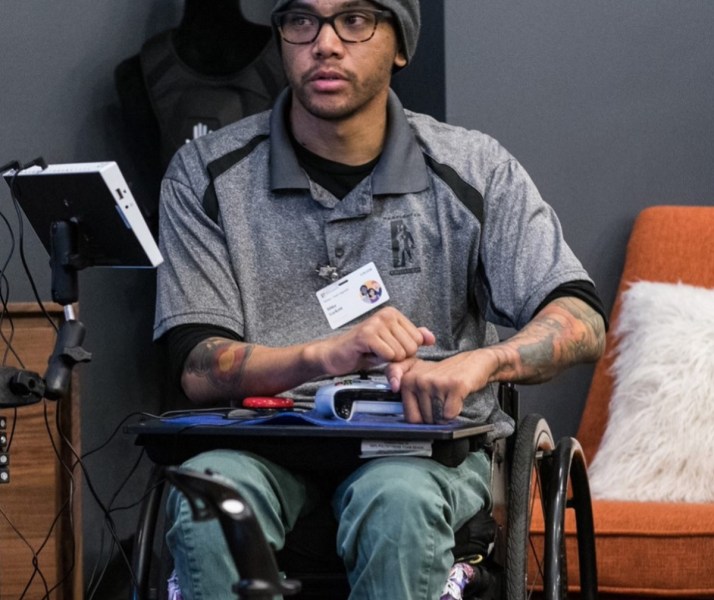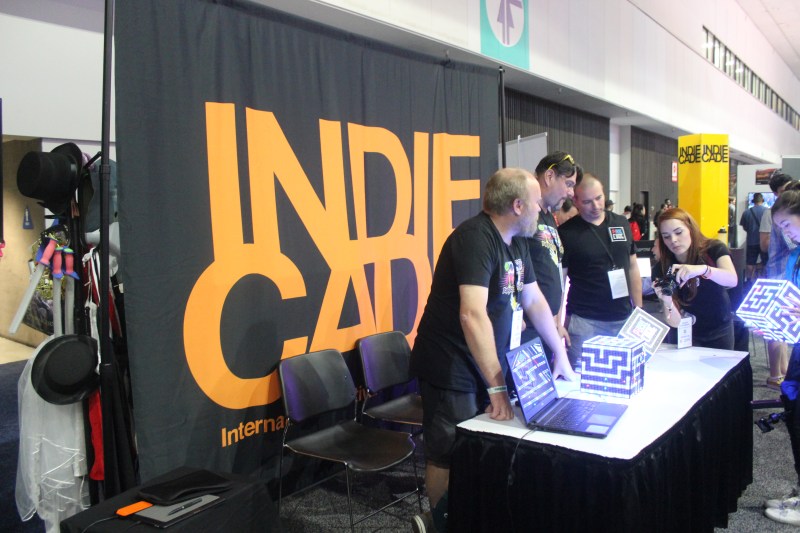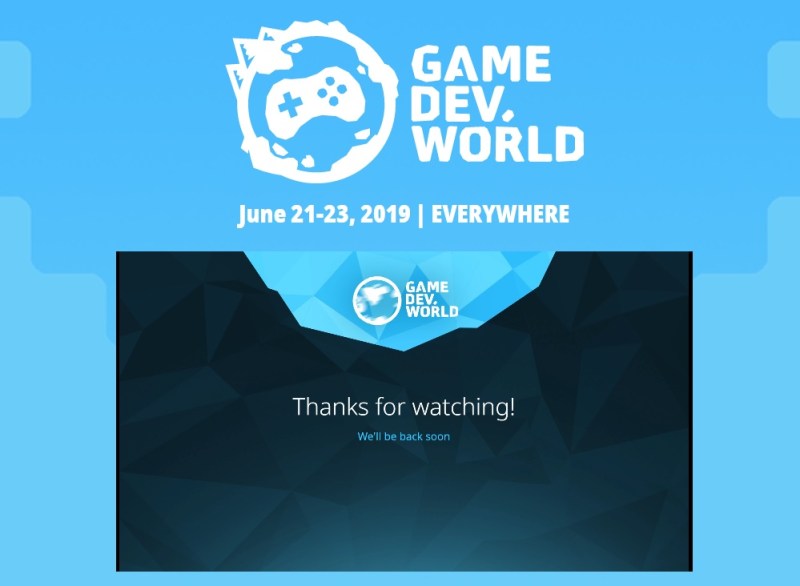The game industry isn’t as inclusive or diverse or inclusive as it could be. But people are working on it. A group of them spoke on a panel at the recent Gamelab game event in Barcelona in June.
Rami Ismail, cofounder of Vlambeer and a frequent advocate for diversity and indie games, moderated the panel. The panelists included voice actress Sarah Elmaleh (Anthem, Gone Home); Kate Edwards, former executive director of the International Game Developers Association and founder of Geogrify; Myiriame Lachapelle, co-producer of GameDev.World and union activist; and Katie Scott, senior game designer at Electronic Arts.
Ismail, Elmaleh, and Lachapelle recently produced the GameDev.World online-only game conference in June. That 24-hour event was simultaneously translated into eight languages, and it was aimed at uncovering new voices in global game development.
The panelists talked about a variety of topics including GameDev.World, crunch time, and unioniziation. Here’s an edited transcript of their panel. (Note: I am on vacation this week, but I’ve got plenty of interesting content for you to read here.)
June 5th: The AI Audit in NYC
Join us next week in NYC to engage with top executive leaders, delving into strategies for auditing AI models to ensure fairness, optimal performance, and ethical compliance across diverse organizations. Secure your attendance for this exclusive invite-only event.

Above: Left to right: Rami Ismail, Kate Edwards, Sarah Elmaleh, Myriame Lachapelle, and Katie Scott.
Rami Ismail: We want to talk a bit about how to make this industry and this medium more inclusive and more just. I’m sure I don’t have to explain to all of you the feeling of not always being in the best place to be part of the games industry. Spain has an incredible games industry, but compared to being in the United States or in England, there are challenges you have that they don’t have. That feeling is true for other groups of people as well. We want to talk about how to open up the games industry to as many people as possible.
We obviously have very different views on the games industry. I think the best way to kick this off is to ask, what kind of efforts do you think are important? What kind of things are you focusing on in our industry to make it more inclusive?
Kate Edwards: My perspective on this issue is that it’s the cornerstone of my career in the game industry for the past 26 years. As a geographer, I’ve been in the industry doing culturalization work. Essentially, what I do is I help game developers adapt their content to other cultures and make sure there’s nothing in their content that’s going to be problematic. We’re going to make sure the content meets local expectations as best as possible.
Sometimes those local expectations are defined by the government. They have rules about certain things you can or can’t show. But it’s more than that. It’s not just about ratings board and things like that. It’s more about, what are the cultural mores and values of that local culture, of that country, of that region, whatever you define it? Can we make sure that the game content is being designed in a way that’s going to be compatible?
I want to make sure that when game developers are creating—they have their creative vision. They’re doing what they’re doing. But making sure their vision is going to be accessible to as many people in the world as possible. I don’t want game players, for example, to be playing through a game and having a great time in some massive RPG, like Skyrim or whatever it might be, and all of a sudden they see a symbol or a gesture or someone clothed in a way that’s relevant to their culture, and then that person or that symbol is being misused or appropriated or somehow used in a way that’s jarring to them. It basically knocks them out of the experience of having fun and being immersed in the world. That’s what I try and avoid. I help game developers make sure that doesn’t happen. I want to make sure everyone feels welcome in that environment, whatever culture they might be from.
Now, in that process, of course, game developers have their own creative vision. They have a choice. They can always decide that they don’t want to take something out, they don’t want to change it, whether it affects that culture or not. That’s their decision, and that’s fine. They are the ones who own that and they’re accountable for that. My job is to just make sure they’re aware that this could be a potential problem, and that if you leave that issue in there, whatever it might be, you’re actually excluding people from the experience.
From my perspective, I take a very broad, global perspective on this. Yes, I dive into different cultures and different issues in various regions, but my job is to make sure the content can maximize its reach and go everywhere possible. That’s the perspective I’ve taken on.

Above: Mike Luckett was a beta tester for the Xbox Adaptive Controller.
When I first started out doing this work at Microsoft, back when I was there a long time ago, I first was using the argument that we’re doing this because it’s the right thing to do. We want to respect our local customers. We want to respect who they are as people and as cultures. That argument didn’t go anywhere with anybody. [laughs] Eventually I had to monetize the argument, as you have to do with a lot of these things. My advocacy in making sure content was accessible had to be expressed through the fact that if you do this, your game will be accessible in more places around the world, and therefore you maximize your revenue. You’re going into more markets.
When I used that argument, then, of course, a lot of the biz dev people said, “Oh, that makes perfect sense. Of course, we’re going to do this.” But even then it took us several bad mistakes, very public mistakes, for people to finally get on board and understand why this is important.
Sarah Elmaleh: As a voice actor by trade, most of the advocacy or community-building I do comes from there. I’m also working with the actors union in America, SAG-AFTRA, to develop new contracts and increase and enhance collaboration between indies, especially, who don’t often have access to voice actors or understand how to work with them, so that there are new contracts for them. I’m doing more consulting with developers, especially indies, to understand how actors work and how to work best with them.

Above: Indiecade booth at E3 2019
Even within disciplines in the game community, I’m creating conversation and making a bridge where people are often isolated from each other. That’s close to home from the voice acting perspective. But then working with IndieCade, I’ve been an event organizer, and now an awards show host and director. I’m making sure that all of these different kinds of games, whole different genres of games, are feeling included and part of the same community and celebrated properly for inspiring each other and cross-pollinating with each other.
It was that experience, working with IndieCade, through which I discovered a language barrier issue with one of our developers. I started talking to Rami about GameDev.World and that extra layer of diversity that’s about language and culture. It’s true with voice actors too. It’s not enough to just be included in an event. It’s not the same as being integrated into an event. It’s not enough to say that’s someone’s here. Is there genuine curiosity and interest and collaboration happening between these people? It’s not enough to extend an invitation and leave it at that. That feeling and awareness expands across acting and other disciplines in development, and developers as a larger global community.
Ismail: IndieCade is one of the larger independent games events in the U.S.? There’s three of them nowadays, right?
Elmaleh: Yes, there’s three. There’s IndieCade Europe, IndieCade East in New York, and IndieCade in Los Angeles.
Ismail: And awards are open to anybody, just as a reminder for all of you. Send your games to IndieCade. Myriame?
Myriame Lachapelle: My work locally in Montreal — I’ve been involved with Game Workers Unite. I’ve been learning about game rights and labor rights, trying to teach game developers about their rights as workers. As many of you probably know, crunch is bad. We work crazy hours, and often people don’t know about — you can have a vacation. It’s normal to be sick sometimes. You shouldn’t have to go to work when you’re sick, because you destroy your health. In Montreal I’ve been having a few campaigns to help developers, both indie and triple-A, to know about what’s right for them and how to fight their bosses.
With GameDev.World, which happened last weekend, a big thing for me was trying to spread knowledge from people around the world to other people around the world, trying to break the language barrier and have people in their local areas speaking their language — for those who don’t know what GameDev.World is, it’s a free online event. We were live translating every single talk, 35 talks, into different languages – Arabic, French, Spanish, English, Russian, Chinese, and Japanese. And we made it.
Ismail: For Game Workers Unite, one of the common topics you said you come across is that even though people have a lot of rights, they’re usually just not aware.
Lachapelle: Right, they’re not aware. Even me, I thought, “Wow, I should be paid for my overtime after 40 hours? I didn’t know that.”
Elmaleh: That’s one of the things I’m most excited about with the actors union. Some of you may not know that American actors were on strike, asking for different working conditions, better working conditions. Just in the year or two since then, the attitude toward labor rights, in general, has shifted dramatically, at least in America, in game development. Now SAG-AFTRA is partnering and advising. They can’t organize developers, but they can share their knowledge and experience. I’m excited to see that happening.

Above: GameDev.World aired 24 hours of game developer talks in eight languages.
Lachapelle: Sharing knowledge is very important for our industry. We need more transparency around how much, say, a game designer is paid. I’ve been doing a bunch of talks to students at universities. Often, especially with big triple-A studios, they’ll hire students fresh out of school at super low rates because we don’t know better. We need to be more transparent about a lot of things, about everything.
Ismail: Katie, your perspective is that of someone who works in a large company, machine, organization, whatever you want to call it. What are you experiencing there? What do you work on?
Katie Scott: As you mentioned, I’m a game designer at Electronic Arts. I’ve had the opportunity to design a lot of games, I think 10 or 11 at EA, including the last four FIFA games. I consider myself to be a very typical game designer in that my role is to design features for people to have fun with. But in the last five or six years or so, I started noticing that maybe as game designers we weren’t doing our job as well as we could because we were very insular. We were very echo chamber-ey. We were focused on what we believed was the truth of the industry.
Lately, I’ve been focused on trying to rally my game design community on a couple of concepts. The first one is empathy, which is something I talk a lot about, just the knowledge that your experiences and your opportunities and the things you’ve encountered in your life are different from what everyone else has. As game designers, our number one goal is to bring joy to the world through gaming. We need to have extremely deep empathy with other people and think about other people, think about what they go through.
The second is challenging our assumptions, which I believe is also in line with empathy. As humans, we’re very — we have fragile egos. We all have confidence issues. We don’t want to be wrong. But we need to make sure that what we’re basing our decisions on is actually true. To give some examples, I believe that — maybe not in this room, but in many rooms I’ve been in, if you ask who is the prototypical gamer, many would say younger Caucasian males, when in fact they’re not the largest gaming demographic, not even by a long shot. There are many, many other, larger gaming demographics, including women over the age of 35.
The third is the psychological safety to be wrong. When we’re pursuing this space, wanting to include more people, to understand their perspectives and try and do a good job for them, it has to be okay to get it wrong. For example, I’m from Canada. We have indigenous people in Canada that can sometimes be called “Indian,” which actually isn’t the correct term because they’re not from India. They’re from Canada. In my own design recently, I used the word “Indian,” and someone pointed that out to me. I was pleased to see how very little flak I caught for it. Obviously, my intention wasn’t to get it wrong. I think the culture, at least at my company, the culture I’m trying to spread, is that it’s okay to try things. Your intentions aren’t going to be misconstrued.
I’ve been working lately on lots of things at EA, particularly on FIFA. I developed a framework that EA is now using company-wide to help with diversity within our games, mainly around characters. Characters, heroes, things like that, looking at how we can do a better job with characters within our game. We hope that we can expand that over time. Next would be accessibility, abled gaming, and then obviously attracting more diverse developers within our industry.

